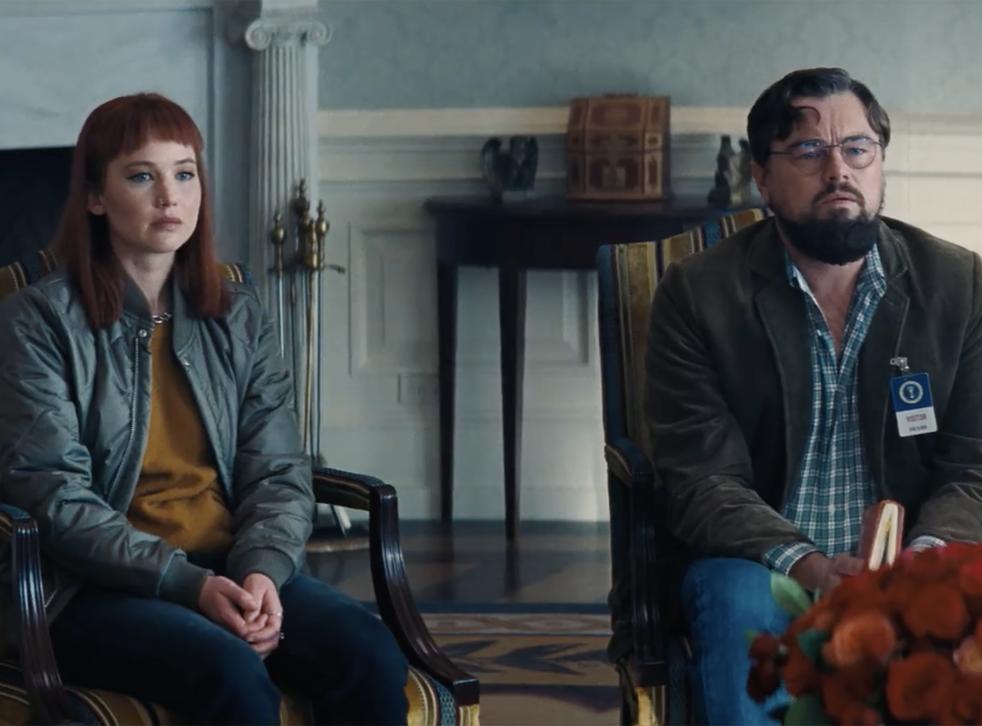Netflix has 27 nominations at this year’s Academy Awards, with 12 whopping nominations for Jane Campion’s alternative western The Power of the Dog. While Netflix’s blinding success is indeed brilliant to witness, one of the Best Picture nominations, in form of Adam McKay’s 2021 film Don’t Look Up came across as a huge (and bitter) surprise.
A month ago, I had penned a very passionate article addressed to the Academy, requesting them to not let the disaster comedy satire win big at the Oscars. I through enjoyed the biting satire and the not-so-subtle allegory about the ongoing global climate change crisis, the government’s lack of appropriate response to it and the media’s precarious predicament. However, the film nomination seems more of fan service to me, given how some other genuinely deserving films like Pig, Annette, Passing and others, were completely snubbed.
Don’t Look Up had some of the biggest names of the industry, namely Jennifer Lawrence, Leonardo DiCaprio, Meryl Streep, Cate Blanchett, Timothee Chalamet, Rob Morgan, Tyler Perry etc. The film also saw Ariana Grande and Kid Cudi in hyperbolic roles. While the overall sarcasm and dark humour employed in the film appealed to my senses, nominating it for a Best Picture award would be taking it a bit too far, especially alongside masterpieces like Ryusuke Hamaguchi’s Drive My Car or Jane Campion’s The Power of the Dog– one of which deserves a win.
While both films are intimate and provocative in their own ways, Don’t Look Up somewhat seems like a feature film version of the celebrity-heavy sketch skits they do at Saturday Night Live, The Jonas Brothers Family Roast (an absolute disaster) and more.
The Academy’s complete disregard for Rebecca Hall’s directorial debut, Passing, too, says a lot about the board. While the board has been called out on multiple occasions for being racist, homophobic and extremely partial, this film, which saw two Black women in the lead, might have not lived up to the board’s racist expectations.
Similarly, Lin-Manuel Miranda’s tribute to Jonathan Larson deserved a nomination more than that of Don’t Look Up due to the depth of the subject matter and the overall filmography.
Here are the two films that deserved a Best Picture nomination more than Adam McKay’s Don’t Look Up:
Netflix films that deserved the Best Picture nomination more than ‘Don’t look Up’
Passing (Rebecca Hall, 2021)
Based on Nella Larsen’s 1929 eponymous novel, the film stars Tessa Thompson, Andre Holland, Ruth Negga, Bill Camp, Gbenga Akinnagbe, Alexander Skarsgard, Antoinette Crowe-Legacy. The film was robbed at the Oscars by not receiving a nomination hinting at the blatant racism at the Academy selection. Ruth Negga, in particular, deserved a nomination. The film also did not receive much of a promotion from the streamer either and the doubly-led Black women film probably did not fit the bill for fan service.
In her directorial debut, Hall’s film hints at a larger sociological issue where the realities of life are tested when two black women are trying to “pass” as white women in 1920s New York at the height of Harlem Resistance, showing the truth of life on the opposite side of the spectrum.
tick, tick…boom! (Lin-Manuel Miranda, 2021)
In his directorial debut, Lin-Manuel Miranda presented to the audience a brilliant exploration of artistic precarity. The film was a heartfelt tribute to Jonathan Larson, the legendary playwright, composer and lyricist whose desired success came to him posthumously after quite a bit of struggle. Portrayed wonderfully by Andrew Garfield who won a Best Actor Oscar nomination for his performance, the film far surpassed Don’t Look Up in terms of content, depth and poignance.
Garfield is a revelation as Larson who is on the brink of turning 30 and is dealing with the paranoia and anxiety of never being able to taste the success that he so deeply yearns for. He is like Prufrock from T.S. Eliot’s poetry as the film basks in the transience of time, his frustration as an artist and the rejection that becomes a defining moment in his legacy.
